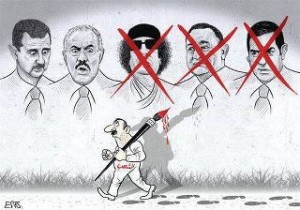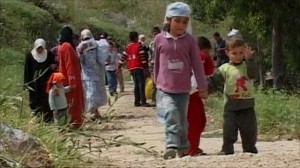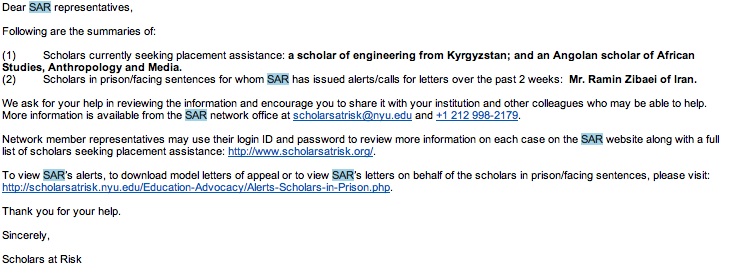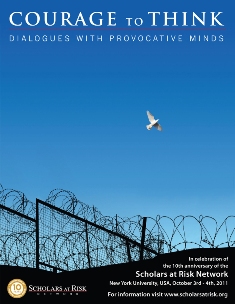Negationism, Freedom of Speech and Genocide Ideology Laws in Rwanda
Andrea Dooley
The recent 3rd Annual International Genocide Conference held at Sacramento State University took as its theme “Negationism, Revisionism, Survivor’s Testimonies, Eyewitness Accounts, Justice and Memory” and included a broad and ambitious conference agenda with a plenary session on November 3 that was focused on the good governance and reconciliation efforts of post genocide Rwanda. The session titled “Rwanda Governance and Socio-economic Development” included members of an economic, reconciliation and justice delegation from Rwanda and a broadcast of a keynote address to be delivered via Skype by Rwandan President Paul Kagame.
The plenary speakers presented economic indicators, statistics and other data models demonstrating Rwandans economic growth and move toward democratic governance that, they argued was evidence of a positive atmosphere of reconciliation, unity and justice in Rwanda spearheaded by the strong leadership of President Kagame. In almost every case, speakers argued that what they presented were facts not ideology and those who would criticize or challenge these facts were “deniers.” (Denier is the specific term used by several of the panel speakers.) Indeed, one speaker was adamant that those who would challenge the facts as presented by the panel were in fact supporting an ideology that was aimed at destabilizing the current Kagame government and had roots in the genocide ideologies of the past. In the end Kagame did not speak live or take questions. Rather he spoke via a pre recorded YouTube video; the substance of which urged academics to base their judgments of Rwanda on facts and not on ideology and to combat those who would criticize or deny the strides Rwanda has made since the genocide.
It became clear once the panel session came to an end why each speaker was so concerned with positioning their presentations as facts while those who were questioning those facts were motivated by ideology. Outside in the hall a small group of protestors had gathered passing out leaflets that raised objections about the Rwandan delegation’s visit to the campus and the Kagame administration’s claims to good governance and social unity. The leaflets produced by a coalition of organizations including INGA Association, the Congolese Community of Northern California and the African Great Lakes Coalition who are calling for a thorough review of the actions of the Kagame government with respect to the Democratic Republic of Congo. The leaflet highlighted a leaked 2010 UN report that accuses the administration of human rights violations in Eastern Congo. When the report surfaced the Kagame administration argued that the report was politically motivated, malicious, irresponsible and the charges were patently false. In response, the Kagame administration threatened to withdraw the Rwanda contingent from UN Peacekeeping forces in the Sudan region of Darfur. (In fact in UN Secretary-General Ban Ki-moon flew to Rwanda to meet with President Kagame to urge him to allow Rwandan troops to remain a part of the larger UN peacekeeping forces.) The final UN report took a more cautious tone and the Rwandan government was allowed to include a detailed response to the allegations in the report—allegations that they categorically reject.
But I was struck by the use of the word deniers to describe the activities of the protestors outside the conference venue. Understanding how that word has crept into discussions of economic growth, programs to foster good governance and industrial expansion in the post conflict Rwanda has as much to do with how post-conflict nations and its leaders go about creating a stable, economically viable and unified country as it does with genocide ideology laws enacted by the Kagame administration said to be necessary in order to prevent future violence.
Law N°18/2008 passed into law in Rwanda on October 2008 is deceptively brief. One sentence describes its aim as “ preventing and punishing the crime of genocide ideology.” And article 2 of the law defines genocide ideology as “an aggregate of thoughts characterized by conduct, speeches, documents and other acts aiming at exterminating or inciting others to exterminate people…” Proponents argue that this is a straightforward genocide prevention law deemed necessary in the wake of the violence of the 1994. The law includes penalties with steep fines and prison terms ranging from 10 years to life for crimes that are described as follows:
“…any behavior manifested by facts aimed at dehumanizing a person or a group of persons with the same characteristics in the following manner:
1° threatening, intimidating, degrading through defamatory speeches, documents or actions which aim at propounding wickedness or inciting hatred;
2° marginalizing, laughing at one’s misfortune, defaming, mocking, boasting, despising, degrading, creating confusion aiming at negating the genocide which occurred, stirring up ill feelings, taking revenge, altering testimony or evidence for the genocide which occurred;
3° killing, planning to kill or attempting to kill someone for purposes of furthering genocide ideology.
Critics of the law including Human Rights Watch and Amnesty International have argued that the law is far too vague and can be interpreted and applied in uneven ways including silencing opposition to the current administration and curtailing free speech in the country. Many are concerned that phrases like “actions which aim at propounding of wickedness” and “laughing at one’s misfortune,” could be used by one or another party in a dispute that has little or nothing to do with hate speech and incitement to genocide. More troubling though is the charge that the Kagame administration has used Law N° 18/2008 to squash opposition parties and criticism of administration policies. In fact a report by Amnesty International titled “Unsafe to Speak: Restrictions on Freedom of Speech in Rwanda” is concerned that the vagueness of the laws allows for all kinds of interpretations that could be used to close newspapers and other media outlets and provide a legal avenue for the detention of journalists and other administration critics.
In the case of media outlets and the incitement to genocide, a precedent had been set by the International Criminal Tribunal for Rwanda in 2003. In December of that year, an indictment by the ICTR was handed down for 3 individuals, Ferdinand Nahimana, Jean-Bosco Barayagwiza, Hassan Ngeze, each man accused of, among other things, crimes against humanity and incitement to genocide. Each defendant was either the head of a media outlet (newspaper or radio) and/or a journalist who were accused of having direct influence on the violent events in the spring and summer of 1994. Programs, articles and editorials called for the elimination of the Tutsi facilitated through a well organized and community coordinated mass killing. That the trial of journalist was taking place at all had, at the time, drawn great attention to issues of the media’s role in state sponsored violence and would redraw the ethical boundaries of journalism in the international arena. Those ethical boundaries were tested when, after the passing of Law N°8/2008, several Rwandan news papers where closed and some opposition leaders were arrested.
To be sure, concerns over the provocative nature of hate speech and the role of the media in the Rwandan genocide is a real issue. And the Kagame administration has argued for tougher laws to combat hate speech and other tactics used to incite violence and destabilize the country. By many of the United Nations standards and other markers of success as presented by the plenary speakers at the Sacramento State Conference, Rwanda has achieved a more stable national economy, doubled the household income, provided universal healthcare and seen a rise in primary and secondary education completion. The speakers argue this is all made possible by a push toward good democratic governance, strategies for unity and reconciliation and appropriately applied justice. Kagame has maintained that those who have been detained or incarcerated under the statues of the Law N° 18/2008 are using similar language and tactics to those who perpetrated the genocide of 1994 and must be silenced in order to protect against further violence and foster a stable and unified Rwanda. When accused of over-stepping his bounds and incarcerating opposition leaders and using the genocide ideology laws to silence critics, Kagame, in an interview with CNN’s Christine Amanpour, maintained that the accusations were false, malicious and an “insult to history” raising the stakes even higher by making national unity and “history” itself the focus of debate rather than freedom of speech, opposition to Kagame’s policies or the uneven enforcement of the genocide ideology law.
But whether you believe that the actions of the Kagame government are justified by a greater need for stability and move toward economic independence or have stretched the interpretation of Law N° 18/2008 to the further their own agenda or something in between; the debate over the freedom of speech in the aftermath of this kind of conflict continues. The final speaker of the plenary session at the Sacramento State Conference, Dr John Stanfield, Director of the Intercultural Philanthropic Studies Program at Indiana University, contended that there are crucial actions for any country seeking reconciliation and justice after violent conflict namely: maintaining respect for civil society, implementing checks and balances on social relationships with government, understanding the role of critical journalism including fostering a strong academic presence (the Rwandan constitution requires that two members of the academy be members of parliament) and open avenues for freedom of speech. But the questions remain: What is the nature of free speech in the aftermath of this kind of violence? What is the line between active and productive criticism and hate speech? How does a post-conflict society foster a civil society and account for difference? And, How do nations provide both security and transparency and maintain order without violating the international human rights of their citizens and the sovereignty of their global neighbors?
For more information:
Full List of panels and sessions of the Sacramento State Genocide Conference 2011
http://www.csus.edu/ethn/Genocide%20Conference%202011/GenoConf.stm
Full text of Law N°18/2008:
Kagame CNN interview:
http://www.youtube.com/watch?v=WED8dYiBvcE
UN Mapping Report about the DRC: http://www.ohchr.org/EN/Countries/AfricaRegion/Pages/RDCProjetMapping.aspx
Rwanda’s Response to the UN DRC report:
http://www.ohchr.org/Documents/Countries/ZR/DRC_Report_Comments_Rwanda.pdf
http://af.reuters.com/article/topNews/idAFJOE69002U20101001
http://www.rnw.nl/africa/article/rwanda-un-congo-report-insult-history
http://www.npr.org/templates/story/story.php?storyId=129635622
UN Secretary Ban’s trip to Rwanda:
http://www.bbc.co.uk/news/world-africa-11229201
ITCR verdict:




